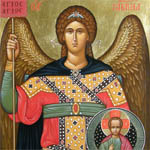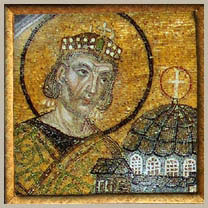Here 's an introduction to ikons with a big gallery of images to browse.

Chapter XXXI
Visits to Shapalernaia Prison, Commissary Schinkler
I made up a big parcel of everything my husband needed for the night, and I added. to it a kettle, a bottle of milk, some coffee, some sugar and- some white bread for his early breakfast. I left Marianne's at a quarter to eight and, once again, I looked about fruitlessly for a jiacre. The street was deserted, owing to the hour and, still more, owing to the season of the year. I walked slowly towards the prison, bent under the weight of my unwonted burden. I crossed the Millionaia, the Roumiantzeff Square and the quays, passing in front of the British Embassy and the Summer Gardens. At the spot at which an attempt was once made on the life of the Emperor Alexander II and where a chapel had been erected, I stopped a moment. I uttered a short prayer and invoked the Emperor's help for his son. . . Then I continued on my way as far as the French Embassy, where I turned into the Schpalernaia Street. After traversing the Liteinaia, I found myself at the gates of the prison. The evening was bright and hot, and I was breaking down from fatigue and the heat and thirst. I showed my permit to the official at the prison gates; he let me in and told me to wait in the courtyard. Looking round for a bench or a chair to sit on and on which to deposit my bundle for a moment, I noticed the stump of a tree-trunk, which looked as though it might perhaps serve as a stool for the night-guardian. I sat down on it and, taking my head in my hands, I abandoned myself to sad reflections. The tears suffocated me. I asked myself what my dear Vladimir was doing and how my young daughters were getting on without us at Tsarskoe. The ordeals to which my dear husband was being subjected were rending my heart. . .
All was tranquil in the prison courtyard. Only a hospital nurse came and went, busied over her duties, now carrying medicine bottles} now a compress, or bandages. The third time she passed me, I got up and, addressing myself to her, said:
"Sister, do you know when they will be bringing Grand Duke Paul Alexandrovitch here? .. She gave a start and, lifting up her arms, exclaimed:
" What, he also! They are going to bring him here! Oh, the monsters, the bandits!"
Seeing that she was on our side and that she had a noble and compassionate heart, I told her what I had suffered duriug the last two days. She put her arms round me, and kissed me and said:
"Be at ease in your mind and make your poor little daughters be also. Ten them that as long as I'm here their papa shan be weli looked after. The prison doctor is excelient. Although a Jew (his name is Silberberg), he is all for the old regime. I can count on him."
She remained a little longer with me. Suddenly the sound of an automobile stopping at the gate made me start. The gate opened- wide and I saw my beloved between two soldiers with drawn swords. He perceived me at once:
"My wife, my dear wife, what happiness! I had no hope of seeing you again so soon; how did you secure a permit? "
I had my arms round his neck and could not utter a word. The nurse dried her eyes with her apron. The two Red Guards looked on without saying anything.
At last it was necessary to go into the prison. I went up with my husband; no one stopped me. First, we went into the office of the Director of the prison, where we were left alone for a moment aud where I asked my husbaud what I should send him next day over and above his food-his medicines, linen, cigarettes, books, etc. Then we were made to go into the clerk's office for some formalities. Everyone was kind and polite and deferential towards him; they were all adherents of the old regime. The Director confided to me that the uew Commissary of the locality, the Jew Schinkler, was odious, and that he would probably be present at our interviews. We remained a few moments longer together; I said to my husband (Alas! what false reports were iu circulation J) that someone who had arrived from the Urals was said to have seen Vladimir safe and sound. His dear face brightened.
"You see! " he exclaimed. "God will protect you, my darling. We shall be recompensed some day for all our sufferings."
They took him at last to the separate cell which he preferred to the general room. I went the whole long way back on foot. On reaching Marianne's home I went to bed at once, feeling broken down with fatigue and emotion.
Next day, as I could not see the Grand Duke, it was my good little Marianne who undertook the duty of takiug his luuch while I returned by train to Tsarskoe. I had telephoned to my daughters to send the boy to meet me at the station with the carriage and the old horse, but they were not to be seen when I arrived, and I went to the cottage on foot. The girls threw themselves on me and overwhelmed me with caresses. I had to tell. them everything from the beginning. They, in their turn, told me with indigination, how that morning the local Soviet had sent round for the horse and carriage. The thieves had need even of this miserable turn-out!
I passed the day with them, and in the evening I took the train back to town, for the morrow was the day of my rendezvous with the Grand Duke. Before leaving, I arranged with the valet and his wife that, every secoud day, they should bring the food for my husband by the nine o'clock train. I made a list for three times a week: soup, eggs, chicken cutlets, bread, butter, cafe au lait, mineral waters, etc. Theu I had my mind at rest. All these forms of food were hard to get; at this period each meal cost 600 roubles in all to send, but to bring comfort to the Grand Duke was the aim of my life.
I passed the night with Marianne, who decided that the study should become my bedroom and that I should occupy it whenever I needed. Next morning at ten o'clock - my visit was fixed for eleven - I set out for the prison. On entering, I met the good Director, with his fine white beard, and he said to me in. a low voice:
"The Commissary Schinkler is in my office; go. in, as you have a permit; there are two other ladies there already who have come to see their husbands. Be very prudent during your conversation."
I went into the office. To the right, on the couch, a prisoner and his wife were seated; to the left, on two chairs, were another couple. At the further end of the room, near the writingtable, was Comrade Schinkler.' I shall never forget the look of that man; he had the eyes of an assassin. A round face, clean~shaven, curly hair. Since the Bolshevists had usurped power he had arrived from America where he had lived during the Tsardom after escaping from a convict prison. I greeted him on entering, but he did not greet me in return.
"Your permit!"
I showed him my document.
"It is extraordinary how generous they are with these permits," he laughed mockingly; "if that were left to me -"
Then, turning towards a soldier:
"Bring in the prisoner Romanoff."
At the end of ten minutes the Grand Duke entered. \Ve seated ourselves a little to one side. I spoke to him of the childrcu and of the house; I questioned him regarding his health, etc. I noticed that Comrade Schinkler never removed his eyes from us. Suddenly he took a chair and planted himself down between us.
"I have the right to know what prisoners are talking about," he said. "Now talk! "
I noted a look of anger in the Grand Duke's eyes ~ I pressed his hand.
"But, Comrade," I said, " we have no secrets; you can listen."
" You spoke just now of a letter, a note ~ I heard you quite well," he said.
"No, you are mistaken," I replied. As a matter of fact I had said that a letter written by me had gone to the King of Sweden.
"The interviews are!" the Jew called out, pushing back his chair. "I have something better to do than to listen to all these sweetheartings."
Two soldiers led off the Grand Duke, who despite this hateful atmosphere, preserved his air of noble dignity. I left with the two other women, who, like myself, cursed the Soviet regime, so arbitrary, so unjust and so hard.





